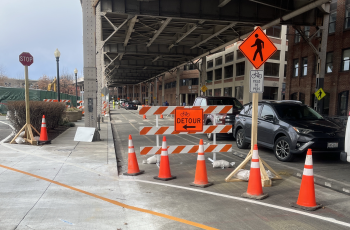These water tests can indicate if your service line or indoor plumbing has a significant lead source.
DC Water offers annual free lead testing for residential and commercial customers. Lead test kits are mailed to customer households and residents are responsible for collecting water samples. The kit includes two sample bottles, detailed sampling instructions, and information and a questionnaire about plumbing materials. These water samples provide a snapshot of the water quality in your pipes at the moment of collection, which can indicate potential sources of lead such as household plumbing, fixtures, and service pipes. In other words, the results from these lead test kits are used to determine the existence (or presence) of a lead source in the service line or plumbing.
When water sits in contact with metal, the metal can dissolve or release into the water. Brass fittings, particles on faucet aerators, and sediment accumulation at elbows and bends can leach lead in very small amounts that will contribute 1 part per billion in a water sample collected after stagnation). Water test results should be evaluated in combination with other data such as service line pipe material, indoor plumbing, and remodeling projects that included plumbing to determine if your home has a significant lead source that should be removed.
DC Water provides lead test results approximately four to six weeks after samples are delivered to the laboratory. DC Water mails results with a letter describing sources, health effects of lead, and methods to minimize lead in water. Results are posted to your DC Water account, and the other information is available on the DC Water website.
If you have any questions, contact the Drinking Water Division at (202) 612-3440 or email leadtest@dcwater.com, and complete this form to request a lead test.
Independent, certified labs in metropolitan Washington also provide water testing for a fee. To find a certified laboratory, visit the EPA’s laboratory certification page. These local labs may provide water quality testing:
- Environmental Testing Laboratory, Inc.
(301) 932-4775 This lab can drop off kits for collection and the resident can ship back or deliver. Parameters they test for: bacteria, metals, inorganics and secondary contaminants.
- Water Testing Labs of Maryland
(301) 932-4775 This lab provides test kits in which the resident can sample and send back to the main lab in Stevensville, MD. They do not offer in-home sampling services. They do test for bacteria as well as many other parameters. http://www.wtlmd.com/wastewater-testing-pricing-maryland-md-va-dc-de.php
- Chesapeake Environmental Lab
(800) 300-8378 They do not provide test kits, but they will visit the resident’s home for a service fee. Parameters they test: Arsenic, Bacteria, Cadmium, Copper, Fluoride, Iron, Lead, Nitrate, Radium, Sulfur, Alkalinity, Fecal Coliform, Oil & Grease, Ortho Phosphorous, Ammonia, E.coli, TDS, Total Phosphorous, BOD, Nitrate, TKN, TPH, Chlorides, Nitrite, and TSS.
- AMA Analytical Services, Inc.
(800) 346-0961 This lab does not provide in-home sampling services nor do they provide test kits. They request the resident to send or deliver a 1L sample to their lab in Lanham, MD. Parameters they test: Lead and Copper
District Department of General Services provides lead monitoring results for drinking water in District public schools — results available here.
Household Lead Profiles
A lead profile can help identify locations and sources of lead in household drinking water. Sources of lead may include plumbing fixtures, lead solder, or a water service pipe. Typically, profiles are conducted in homes that have had a recent water sample with elevated levels of lead. DC Water investigates these cases further to determine causes for unusually high lead levels and consequently share those findings with customers.
Lead profiles involve a plumbing survey and water sampling. During a plumbing survey, a DC Water technician inspects the water service connection, household plumbing, and systematically collects samples to determine the composition of pipes and fixtures in the house. The technician collects over a dozen samples to assess the presence of lead in water in different sections of plumbing at that time to best identify possible sources of lead throughout the house.



